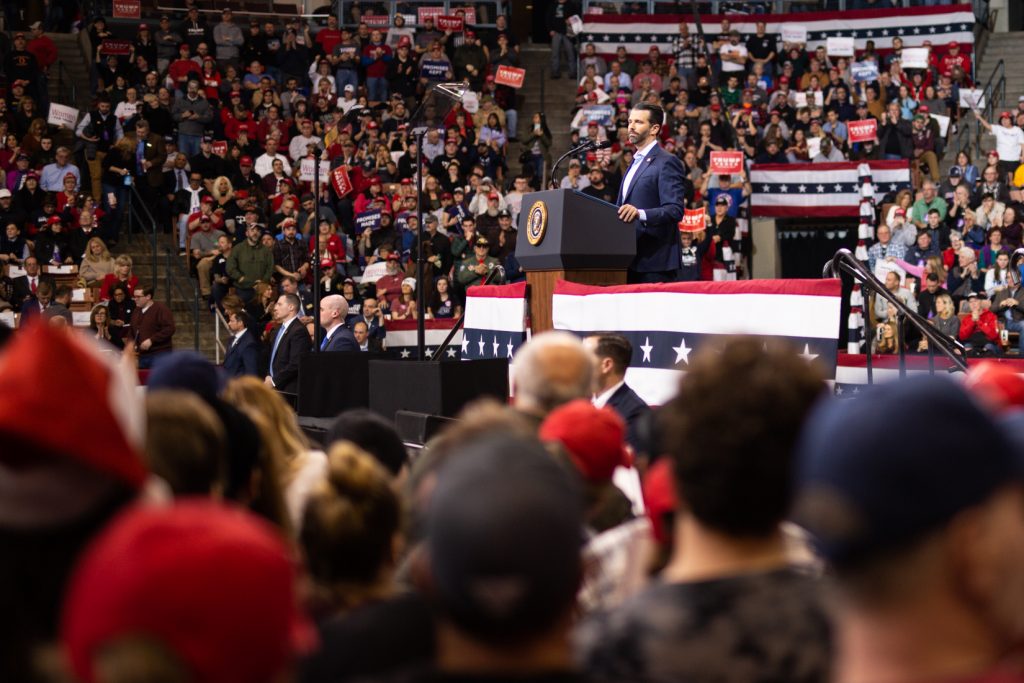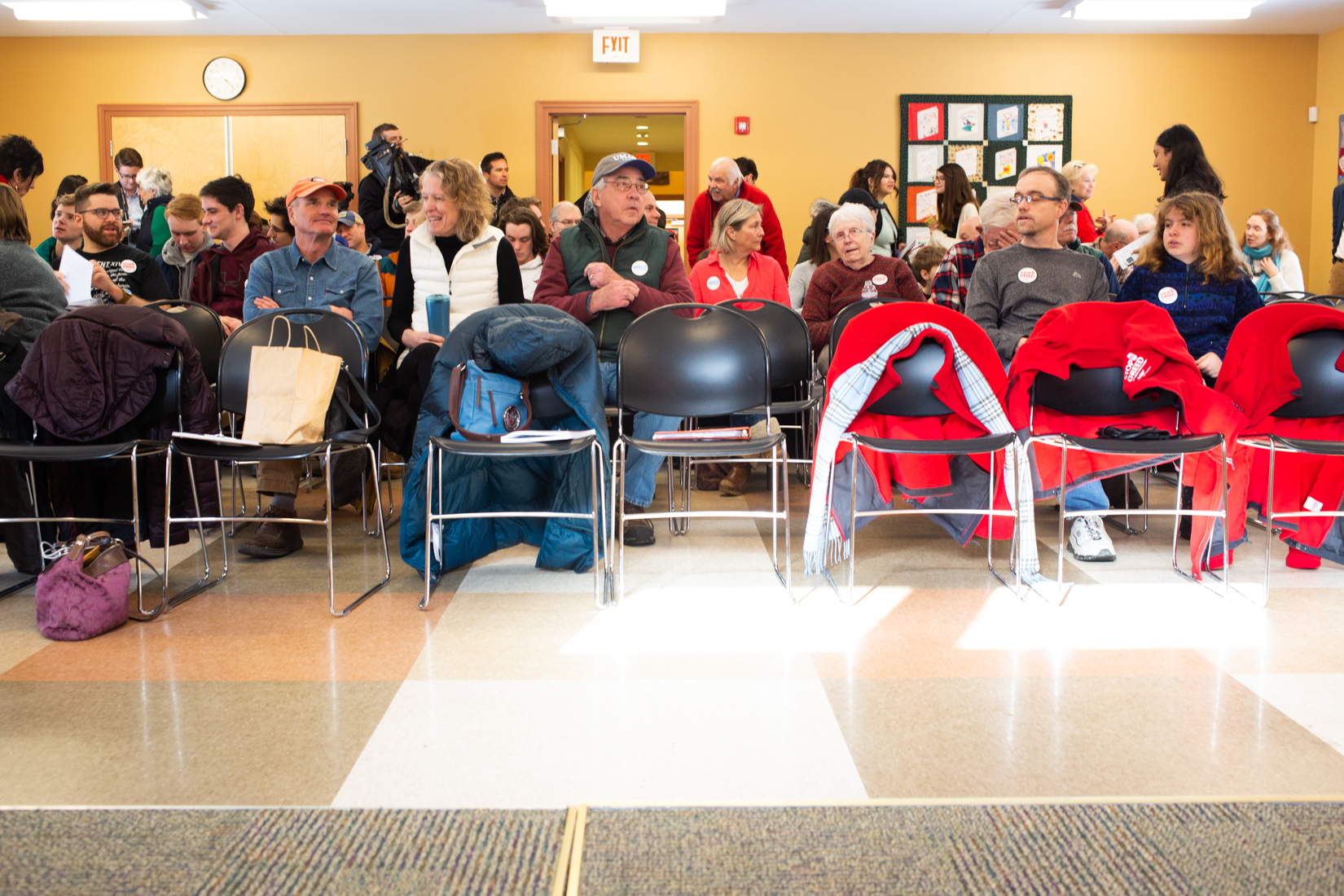
On the eve of the NH primaries, Donald Trump held a rally in Manchester. Outside, the snowy streets were lined with tents selling hats, tshirts, flags, signs, pins, scarves, and gloves with his campaign logos and likeness. But his supporters walked on, already prepared, dressed head to toe in their Trump gear. The line was full of smiles, children, seniors, men, women. Supporters lined up the night before to get in early for a front row view of the incumbent president, standing at the gate before his podium hours before his arrival.
Inside, the energy was palpable. His supporters screamed and filmed his entrance as they would a musician at a concert. The packed stadium erupted in chants of “lock her up,” booing at the mention of any Democrat, and promises to one another that the U.S. would never, ever, ever be a socialist country.
At the modest town hall meeting for William Weld, former governor of Massachusetts-turned republican candidate for the 2020 presidency, the mood was quite different. His supporters, undecided voters, and interest groups alike gathered in the Whipple Free Library, where Weld stood on a stage just barely above them, and lamented about the loss of what they consider the real Republican party.


Clara Monier, Co-Chairman of the Weld campaign, said that she struggled with her Republican identity in recent years.
“I did not support president Trump and I seriously considered becoming a Democrat,” said Monier. “But as a conservative Republican I could not change my party. For me, the big issue was fiscal responsibility…I think many New England republicans, the classic Republicans, are concerned.”
That word, classic Republican, is new, and makes a clear distinction. There are the Trump supporters, and there are the real Republicans who feel like they have no place in the modern party.
Leslie Marshall, writer and former journalist now married to Weld, says that Weld represents these Republicans.
“We sometimes joke in the family that Bill and Mr. Trump are two large orange men with nothing else in common. If Mr. Trump accurately represents the Republican party, then the Republican party is finished. It’s over,” she said.
Marshall said she and other Republicans are not only disappointed in Trump, but in Congress, for their “silence” under his administration.
“I think there is a possibility that the party will split,” she said. “That sort of Trumpian side will go off in one direction and the more centrist, more traditional republicans, more moderate Republicans will either form their own party or very well split…I think the Democrats could split too. I think it’s a very unstable time in our country politically.”
However, some would argue that split has already informally begun. In the days leading up to Trump’s rally and the NH primary, the DNC candidates held town hall meetings and rallies of their own.
On debate night, Bernie supporters gathered for a watch party at the Ultimate Sports Academy in Manchester. They were passionate, too, and even a little fiesty, shouting “terrorist” at the screen when Republican leaders were mentioned.

Johnathan Edward Cross, an art educator in Manchester, says Bernie is the only candidate that’s fighting for the working class.
“At this stage in my life I’ve fought for change for so long and Bernie’s the last great hope I could see for an opportunity for this to change,” Cross said. “With Bernie you have someone who actually can bring in the young people that are going to be needed…by not having Bernie on the ticket, you lose all those young people and they are disaffected and then facism rolls over them that much faster.”
The idea that a left candidate like Bernie or Warren is the only candidate that works persists among their supporters, particularly a new young left.
At Bernie’s rally in Dartmouth, students delivered passionate introductions which included their struggles to pay for school and afford basic necessities. They asserted that Bernie is the only candidate that advocates for them–and that they are fully in support of his social policies.
“I solidified my value system first,” said the second opening speaker, a Dartmouth student. “Then realized that the only person who has embodied those values in their entire life as a public servant was Bernie Sanders. As someone who grew up in a time when everything seems hopeless, I look at Senator Sanders and what his movement represents, and for the first time I feel hope,” she said.

The Sanders supporters are fed up with the status quo, including the DNC. Their passion for Sanders is opening the dialogue for a new branch of liberalism that crosses over into a leftism that they are both unwilling to compromise and unashamed of.
Catherine Lynch, 31, is a stay at home mom from Norwich, Vermont. She attended a Bernie rally at Dartmouth with her two young children.
“I’m a big Bernie supporter, especially for Medicare for all, and for the climate because I have these two young ones and we’ve got to think about our future,” said Lynch.
Lynch said she identifies as Democrat, but she leans more towards Democratic Socialist organizations. Growing up, though, Lynch recalls the stigma around those ideals.
“Socialism and communism was something for freeloaders, hippies. My parents are both Democrats but to this day they won’t vote for a socialist. I think millennials are sort of reclaiming it as something positive. Were one of the only first world countries without socialized medicine, we have such substantial student debt, that I think we know that it’s not practical and capitalism isn’t working out anymore.”

Moderate Democrats are getting mixed responses. Biden came in 4th place in the Iowa Caucus, just below Warren, whose policies closely align with Sanders. Following the Iowa Caucus, it’s clear that the left is just as divided as the right, with Buttigeig and Sanders winning 26.2% and 26.1% of the votes, respectively, according to the Associated Press.
These early trends in the polls and voter attitudes demonstrate one possible route for an already polarized America: the moderate Republican base turning their backs on a party they feel has turned their backs on them, and the new American left separating from a party they feel doesn’t act urgently enough and doesn’t really serve them.
























Be the first to comment